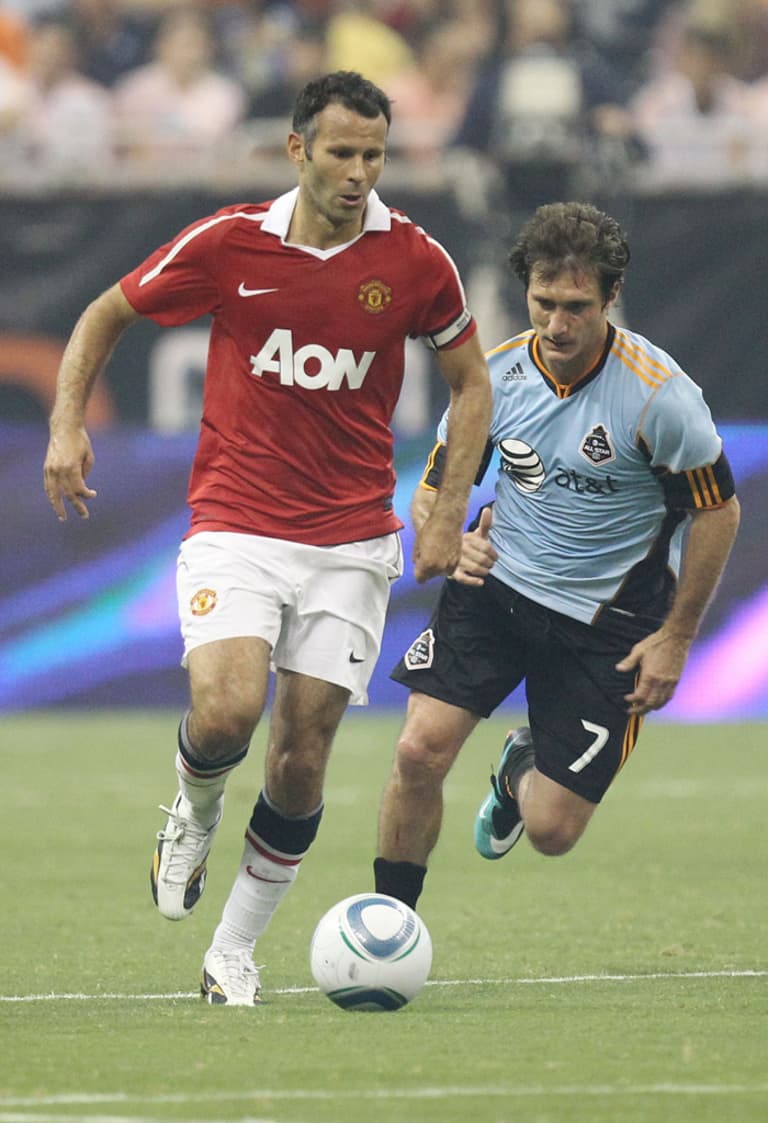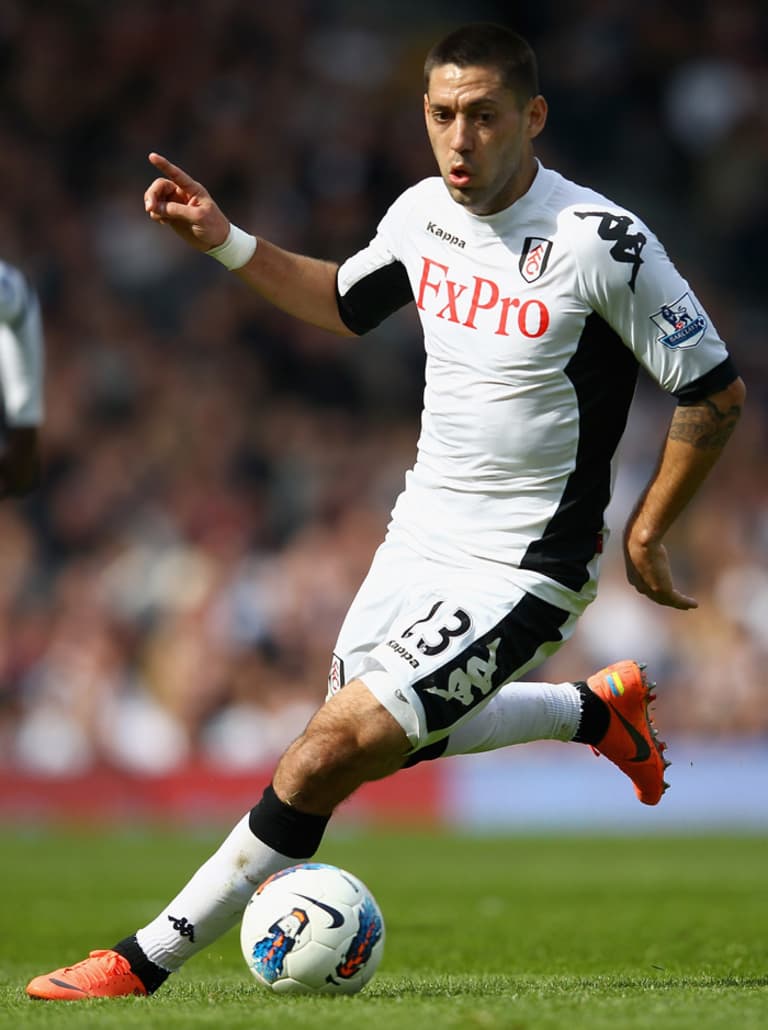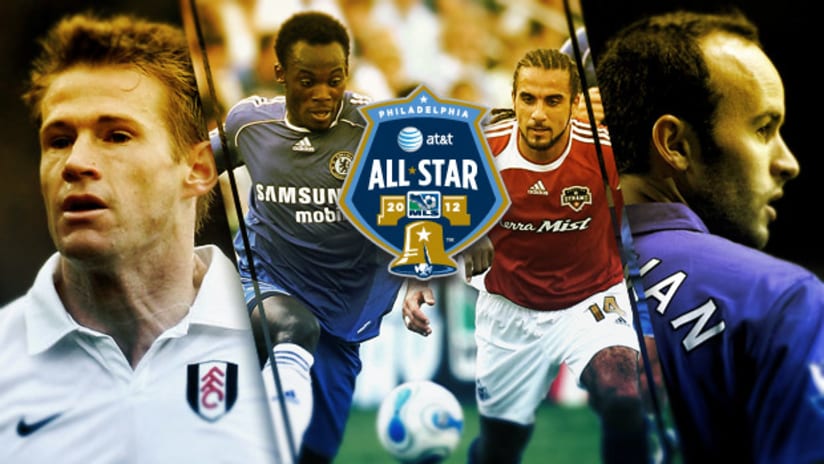Take a look around the AT&T MLS All-Star Game at PPL Park on July 25 and you’re bound to feel one of two emotions, depending on just how well you’ve followed Major League Soccer over the past eight years.
If you’re a relatively new fan, perhaps you’re impressed or even surprised that that is, in fact, Chelsea FC lined up against the MLS All-Stars. That’s the same Chelsea who just two months ago were crowned UEFA champions after a dramatic shootout win in Munich, punctuating the London-based club’s meteoric rise to one of the top squads in the world.
But if you’re an old hand at the MLS All-Star Game, you’ve seen all of this before. That’s because MLS has been there and done that in recent years with Fulham, Chelsea, Everton, West Ham and even Manchester United, perhaps the most accomplished and recognizable club on the planet over the last decade.
Chelsea’s arrival for this year’s game marks the seventh time in the past eight years that the MLS All-Stars have suited up against a foe from the English Premier League, continuing a suddenly undeniable summer tradition. The US and England – who 16 years ago were separated by an ocean of soccer history, experience and resources – have grown together in recent years to swap everything from blue collar players to high-powered owners, and all signs indicate that relationship will only get stronger in the future.
Turn on the television this fall and you’ll find former MLS hero Clint Dempsey playing on ESPN. Or switch over to Fox and maybe you’ll catch a glimpse of Liverpool owner John Henry, the American sports businessman who bought the iconic club in 2010. And if the Reds are playing Arsenal there’s a chance you’ll spot CEO Ivan Gazidis perched somewhere at Emirates Stadium, using knowledge gained through seven years as the deputy commissioner of Major League Soccer to now pilot one of the biggest clubs in the world.
Yes, English football is seemingly everywhere in the United States these days, and there’s been more than a bit of American influence given back across the pond as well. And it appears that both sides wouldn’t have it any other way.
A Change in the Air
The MLS All-Star Game didn’t always carry as much weight as it does now, or the international fanfare. The league plugged along just fine with its summer showcase in the early years, but after a particularly defenseless matchup between the Eastern and Western Conference stars in 2000, MLS Commissioner Don Garber faced a sobering realization while facing a group of media members tired of bloated score lines.
The All-Star Game had to get serious.
“The media looked at me and said, ‘Boy, is this one of those guys who thinks soccer requires goals to be entertaining?’” Garber recalls. “At that point I realized the All-Star Game needed to be more than a showcase for the league. It needed to be a showcase for the sport in our country.”
The league gradually changed course with the game until a watershed moment came in 2005, when the league’s best suited up for the first time against an EPL team. That matchup against former MLS hero and Fulham star Brian McBride was the start of a new era for the league and a welcome change in attitude.
“It was football without any competitive edge,” Gazidis says of the early games. “It was demonstration football. And that had its good points, but it was clear that we could do a lot more with the All-Star Game by having games with a serious side to them, where our stars were really testing themselves against the best in the world.”

That opportunity came at Toyota Park in 2006 against Chelsea, and the league has never really looked back. The MLS All- Stars won that game in front of a national television audience on ESPN, then followed it up with games against West Ham United in 2008 and US national team goalkeeper Tim Howard and Everton in 2009.
In 2010 the stakes rose again (right), when a game against star-studded Manchester United drew nearly 71,000 fans at Reliant Stadium in Houston, the largest crowd for an All-Star Game since more than 78,000 fans packed Giants Stadium to watch the pioneers of the league suit up in 1996.
Manchester United returned in 2011 with a tour that dotted the US landscape and sold out stadiums in Chicago, Seattle, Washington, D.C., and eventually Red Bull Arena, where they dispatched the MLS All-Stars for the second year in a row. It was an unfortunate result for the hosts but an emphatic success for their foes from Manchester, who spent the second consecutive summer broadening their fan base in the United States and wooing new fans.
Chelsea, Manchester United and Manchester City might be the headliners who’ve come across the pond in recent years, but it certainly doesn’t end there. Liverpool, Tottenham Hotspur and Aston Villa have US dates this year, and clubs like Newcastle, West Ham, Everton and Fulham have come in the past.
So why the growing trend? Exposure certainly is part of the equation here, as English teams look to hook new fans in a country that’s suddenly more in tune with the world of soccer than it’s ever been. But there are fringe benefits to a US trip as well, and the total package is what keeps English teams coming back every summer.
“The facilities, the weather, the environment, and the professionalism in the United States are fantastic attributes,” Gazidis says. “Any club that goes to the US knows they’ll have fantastic infrastructure and also great competition for good preseason preparation. The US is developing so rapidly as a soccer nation, that it is a priority for many teams to develop their brand in the United States.
“I think we’ll continue to see a lot English teams spending time in the States in the summer.”
And that’s mutually beneficial to MLS clubs, who are reaping the rewards of the interest from their EPL counterparts.
Look no further than the stunning recent ascent of Sporting Kansas City, who hosted Manchester United at Arrowhead Stadium in July 2010 as part of the Red Devils’ enormously successful tour. SKC were still the Wizards then and nearly a year away from opening the doors at their sparkling new Livestrong Sporting Park, but the stunning 2-1 win over Manchester United in front of more than 52,000 fans altered the conversation forever in Kansas City.
“It was the day that we consider everything changed,” says SKC president Robb Heinemann. “When we went into the lead, the crowd, who I think came in mostly as Manchester United fans, really turned. You could tell there was a lot of support for Kansas City soccer, and that result jettisoned us into a really positive place.
“For us,” he added, “that was the day we said this could work and was going to work if we did the right things in Kansas City.”
Just over a year later, Heinemann watched his team compete in the Eastern Conference Championship at Livestrong Sporting Park in front of nearly 21,000 hardy fans, all cheering in unison for the home team.
"We Always Envisioned It"
Of course there’s been more give and take on the field recently as well, and that’s perhaps the most revolutionary aspect of the relationship between American and English soccer.
Americans plying their trade in England is nothing new – John Harkes was the first to play in England in the modern era when he suited up for Sheffield Wednesday in 1990 – but the slow trickle of Americans has become a steady stream, with the EPL ranks often looking to US shores to scoop up promising young talent.

All eyes these days invariably fall on Dempsey (right), easily the most successful field player in the EPL since his former teammate McBride became a Cottagers legend from 2004-08. What started with a blue collar work ethic eventually matured into the swagger of a bona fide star, and last season the former New England Revolution star became the first American to score 50 goals in his Premier League career.
But Dempsey’s success – and that of goalkeeping fixtures Brad Friedel with Tottenham and Howard with Everton – isn’t the only talking points for EPL fans. Everton fans, for example, salivated at the idea of LA Galaxy star Landon Donovan joining them full time after his first loan there in 2010 and then again this spring, when he returned to manager David Moyes’ starting lineup without missing a beat.
A wealth of young players who might someday make up a World Cup roster for the US – names like Brek Shea, Juan Agudelo, Teal Bunbury and Bill Hamid – all trained with EPL clubs during the MLS offseason last winter at the suggestion of US national team coach Jurgen Klinsmann.
And Tim Ream – who rose from a seemingly innocuous second-round pick in the 2010 MLS SuperDraft into a promising star for the New York Red Bulls – made history for the league in January, when he was transferred for a record fee for a defender, helping prove the point that the market for US players has changed considerably since the early days of the league.
“It’s not considered unusual that a top-class player might come from the United States today, whereas I think that might have been considered usual 10 years ago,” Gazidis says.
Added McBride: “We always envisioned it, and hoped it would happen. You want MLS to be a league that can draw interest from some of the top teams of the world, and it’s great to see that happening. If you’re an American soccer fan you want to be able to say we have players who can play anywhere.”
The Business of Success
And suddenly Americans can do business anywhere as well, thanks to an influx of ambitious owners who have looked abroad for new opportunities and landing firmly on EPL clubs. Henry is perhaps the best known thanks to his success with the Boston Red Sox, but he’s one of just five American owners to put their stamp on the EPL since 2005, and they’re making their mark on some of the most iconic clubs in England.
The Glazer family took over at Manchester United in 2005 and has since won four Premier League titles and the UEFA Champions League in 2008. Former Cleveland Browns owner Randy Lerner has held the reins at Aston Villa since 2006, Dallas-based private equity businessman Ellis Short took over Sunderland in 2009 and current Colorado Rapids owner Stan Kroenke extended his reach to England in 2011 when he became majority shareholder of Arsenal FC.
“I wouldn’t call it an American influence, but a person like Stan Kroenke has been a fantastic development for the Premier League,” Gazidis says. “[The American owners] are bringing new ideas to the table that will help the league move forward, but at the same time they’ve been respectful of the traditions and unique cultural background of the English game. And that’s been very positive for the league.”
There is one last subject to be settled on the topic, and it’s really what matters most at PPL Park on July 25. Just how will the MLS All-Stars match up against Chelsea this time around, six years after their first win over the Blues and having matured so much in such a short span of time?
Bruce Arena, for one, is hopeful. The LA Galaxy head coach and former US national team boss has coached in this game before on numerous occasions, most recently in the 2010 game against Manchester United that ended in a 5-2 victory for the Red Devils in Houston.
He’s hopeful about more than just how his longtime player and friend Donovan might play, or whether the league’s youngsters will seize the chance to shine on national television. With such impressive strides made by MLS and with the connection between soccer in the US and England growing stronger by the day, he’s hopeful both sides continue on the path they’ve taken to get here, together.
With one caveat: The soccer will always come first.
“It’s been a great relationship, and one day we’ll make it one in which the games aren’t that easy for them,” Arena says. “One day we want to make things not so easy for them on the field, so when they step on the field against our teams, they know they’re in for a game."













